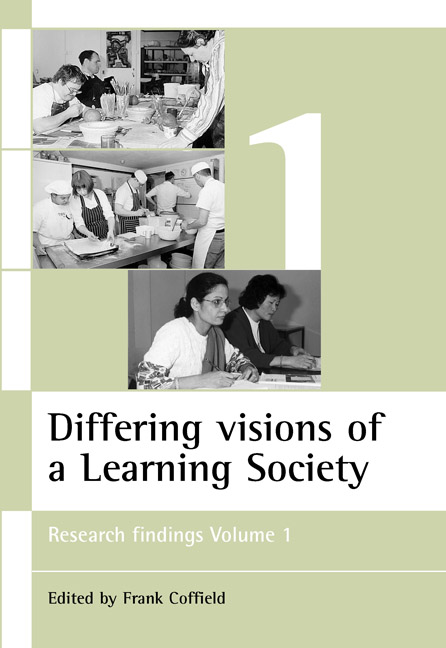Book contents
- Frontmatter
- Contents
- Notes on contributors
- Introduction: A critical analysis of the concept of a learning society
- one ‘Worlds apart’ – Education markets in the post-16 sector of one urban locale 1995-98
- two Unifying academic and vocational learning in England, Wales and Scotland
- three Skill development in higher education and employment
- four The variable contribution of guidance services in different types of learning societies
- five Changing patterns of training provision in the National Health Service: an overview
- six Working and learning in Britain and Germany: findings of a regional study
- seven Development of knowledge and skills at work
- Index
two - Unifying academic and vocational learning in England, Wales and Scotland
Published online by Cambridge University Press: 05 July 2022
- Frontmatter
- Contents
- Notes on contributors
- Introduction: A critical analysis of the concept of a learning society
- one ‘Worlds apart’ – Education markets in the post-16 sector of one urban locale 1995-98
- two Unifying academic and vocational learning in England, Wales and Scotland
- three Skill development in higher education and employment
- four The variable contribution of guidance services in different types of learning societies
- five Changing patterns of training provision in the National Health Service: an overview
- six Working and learning in Britain and Germany: findings of a regional study
- seven Development of knowledge and skills at work
- Index
Summary
Introduction
Many different concepts of the learning society are employed in current debates (see chapters by Coffield, and Bartlett and Rees in this volume), but none is readily compatible with the continued division between academic and vocational learning. Notions of the learning society as a basis for economic competitiveness anticipate a need for new kinds of skills and knowledge which transcend this division. Visions of the learning society as a means to social equality or personal fulfilment reject the inequalities arising from divisions between tracks and the limits placed on the goals of learning by categorising it as academic or vocational. The view of lifelong learning and the learning society expressed in government rhetoric emphasises the need to break down barriers, including the barriers to access and progression arising from divisions between academic and vocational learning. To achieve a learning society, therefore, it is necessary to ‘unify’ academic and vocational learning: that is, to bring them together into a closer and more coherent relationship or to combine them within a unified system.
Most European countries are pursuing policies to unify postcompulsory education and training. In Britain, unification has been advocated by independent policy bodies such as the National and Scottish Commissions on Education (NCE, 1993; SCE, 1996), by industrialists (CBI, 1998), by educational providers (AfC et al, 1994), by teachers (David and Jenkins, 1996; Jenkins et al, 1997) and by some of us and our co-authors in A British ‘Baccalauréat’ (Finegold et al, 1990). However, there are different concepts and models of unification, and different unifying strategies within Europe and within Britain (Lasonen, 1996; Lasonen and Young, 1998). The government's policy in England has developed through the Dearing (1996) Review of Qualifications for 16-19 Year Olds, the Qualifying for Success consultation (DfEE, 1997) and the White Paper Learning to Succeed (DfEE, 1999). It reflects what we shall call a linkages strategy, which maintains the three post-16 tracks but tries to encourage links among them and emphasises their formal equivalence. Government policy in Wales goes beyond the English strategy by giving more emphasis to the role of a single credit-based qualifications framework for promoting lifelong learning (Welsh Office, 1998; ETAG, 1999). In Scotland government policy stands in contrast to that in England and Wales by adopting a unified system: instead of linking the tracks the Higher Still reform is replacing them with a unified system of post-16 education (Scottish Office, 1994).
- Type
- Chapter
- Information
- Differing visions of a Learning Society Vol 1Research Findings, pp. 71 - 104Publisher: Bristol University PressPrint publication year: 2000



